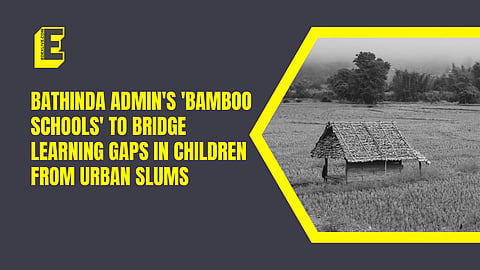
- News
- Campus
- Exam
- Podcast
- Web Stories
- Do You Know
- Path Finders - UG Programs
- Videos
- Book Review

A new initiative by the Bathinda District Administration in Punjab aims to provide remedial lessons to underprivileged students in “Bamboo Schools” close to their localities, before being shifted to regular schools for their formal education.
According to officials, the District Education Society of the administration launched two of these schools last month for children who had never attended school or had dropped out, and two more are on the way.
The name comes from the fact that the classrooms are make-shift, bamboo-made spaces, according to PTI.
Deputy Commissioner of Bathinda, Showkat Ahmad Parray, reported that during a census of the city's urban slums, about 1,000 impoverished children – the majority of which are from immigrant families – were found to have either no formal education or to have dropped out of school.
The "Bamboo Schools" will serve as a bridge or remedial education system, offering essential extracurricular instruction to impoverished students – including those who have dropped out of school – to prepare them for integration into regular schools.
"It is a bridge system as these children cannot adjust to regular schools straightaway. So we start teaching them in their localities, motivate them and involve them to take part in activities. It is a familiarisation process and later formal education in regular schools will be given to them after about one year," he said.
Parray said that the idea of such schools for underprivileged children came to him when he was posted in Patiala earlier. He said that they had conducted a survey there, and found many models which could be applied. After being posted in Bathinda, the initiative to take up the project formally was set in motion.
"We felt that if these children have to be adjusted in a regular school setting then, first of all, they will have to be engaged within their own community and provided exposure to basic schooling closer to the place where they live otherwise they won't be able to adjust," he said.
For the Bathinda project, he said that they were working with NGOs for mobilisation while teachers and interns were being employed by the district administration.
"Currently, we are running two schools and we are planning to start two more in Bathinda at different locations," he said.
He said that while the majority of the children enrolled are younger, there are a few older ones as well as many dropouts. Children are free to come to class whenever they choose between 10 am and 4 pm.
Officials said that the children are also provided with books, notebooks and stationery at the school.
